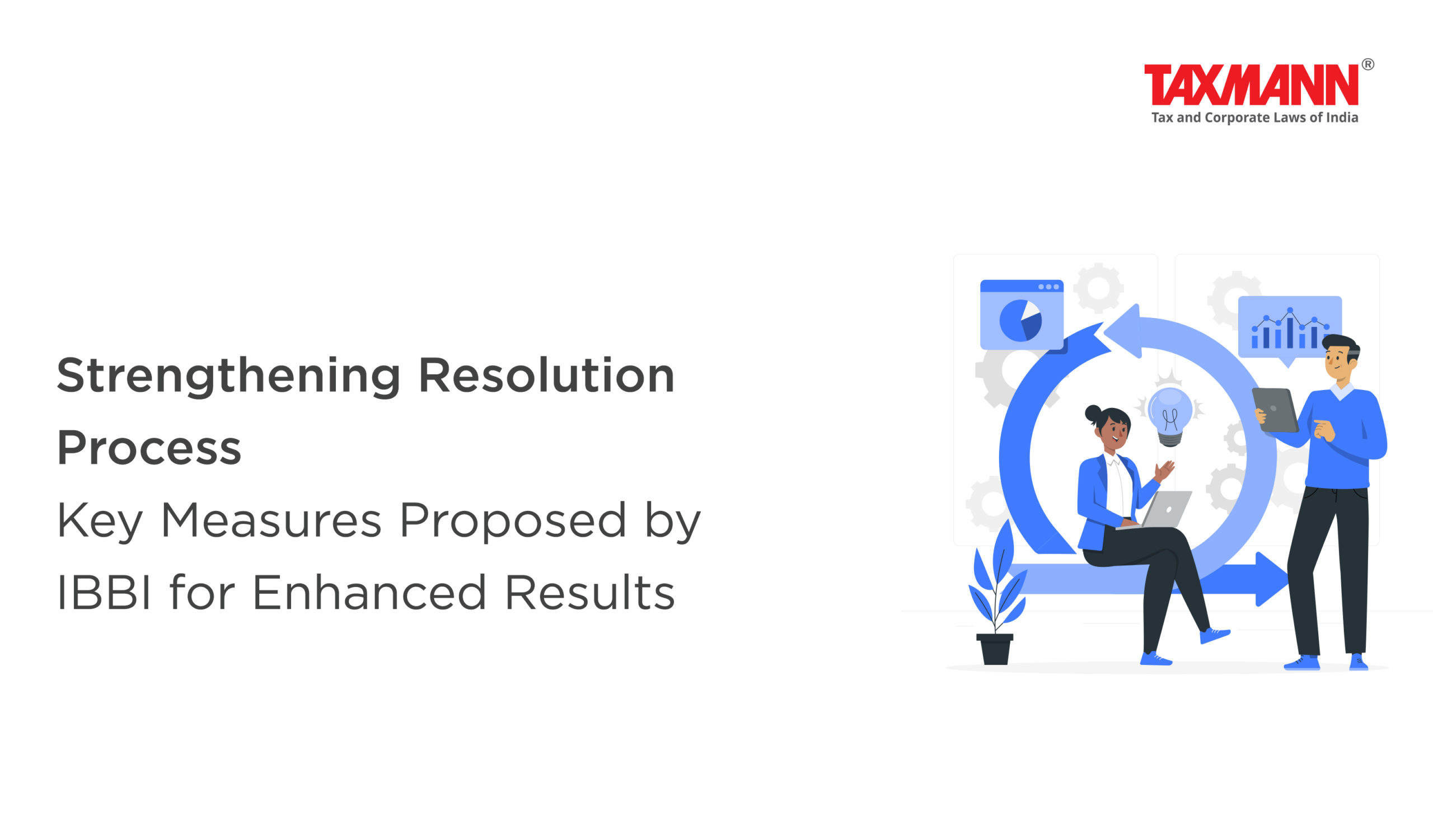Strengthening Resolution Process | Key Measures Proposed by IBBI for Enhanced Results
- Blog|Advisory|Insolvency and Bankruptcy Code|
- 3 Min Read
- By Taxmann
- |
- Last Updated on 25 April, 2024

Table of Contents
- Introduction
- IBBI Proposes fee increase for Authorised Representatives in CIRP to streamline costs and avoid administrative complexities
- Propose to amend the norms w.r.t replacement of authorised representative
- IBBI proposes to mandate requirement of providing a detailed chronology of debt & default
- IBBI in plan to introduce preference voting for approval of resolution plan
- IBBI proposes to mandate audit of Insolvency Resolution Process Cost (IRPC)
1. Introduction
The IBBI has observed that the resolution process under the code is criticized on 2 grounds namely fewer companies are being resolved with lesser value realisation & time taken for resolution is longer than the time prescribed by law. Therefore, IBBI has floated discussion papers to resolve the same.
The proposals include timeline for providing information for assignment of debt, seeking information from personnel of the corporate debtor, Modification of Timelines for Submission and Consolidation of Claims, Increase of duties of Authorised Representative, etc.
2. IBBI Proposes fee increase for Authorised Representatives in CIRP to streamline costs and avoid administrative complexities
The discussion papers have proposed the increase of fee of Authorised Representative. Now, it is proposed that the fee for the AR is designed to be incorporated within the overall cost of the CIRP.
This fee structure is preferable given the potential administrative burden and inefficiencies that could arise from attempting to collect these fees directly from the represented members. The proposals are as under:
3. Propose to amend the norms w.r.t replacement of authorised representative
It is proposed that the creditors in a class with 10% voting powers may seek replacement of the AR by making a request to the RP and may choose to give a choice of insolvency professional who shall act as an AR in the matter.
4. IBBI proposes to mandate requirement of providing a detailed chronology of debt & default
It is proposed that along with the application under sections 7 or 9, as the case may be, for the initiation of corporate insolvency resolution process, the financial creditor or the operational creditor shall also submit an affidavit, providing a detailed chronology of the debt and default, and explaining why the application is not barred by the limitation.
5. IBBI in plan to introduce preference voting for approval of resolution plan
In order to ensure that preference of plan is captured, and creditors are able to vote freely, it is proposed to use system of voting with preference.
6. IBBI proposes to mandate audit of Insolvency Resolution Process Cost (IRPC)
The existing CIRP Regulations provide what constitutes Insolvency Resolution Process Cost (IRPC) but they do not necessitate an audit of these costs. However, considering the significant bearing these costs can have on the overall resolution process, it becomes crucial to assure their veracity.
Therefore, it is proposed to introduce an audit requirement for CIRPs involving CDs of a certain asset size within the CIRP Regulations. Audit timing, eligibility and disqualifications were also provided. Various other proposals were notified. The Comments may be submitted electronically by 27th June, 2023.
Disclaimer: The content/information published on the website is only for general information of the user and shall not be construed as legal advice. While the Taxmann has exercised reasonable efforts to ensure the veracity of information/content published, Taxmann shall be under no liability in any manner whatsoever for incorrect information, if any.

Taxmann Publications has a dedicated in-house Research & Editorial Team. This team consists of a team of Chartered Accountants, Company Secretaries, and Lawyers. This team works under the guidance and supervision of editor-in-chief Mr Rakesh Bhargava.
The Research and Editorial Team is responsible for developing reliable and accurate content for the readers. The team follows the six-sigma approach to achieve the benchmark of zero error in its publications and research platforms. The team ensures that the following publication guidelines are thoroughly followed while developing the content:
- The statutory material is obtained only from the authorized and reliable sources
- All the latest developments in the judicial and legislative fields are covered
- Prepare the analytical write-ups on current, controversial, and important issues to help the readers to understand the concept and its implications
- Every content published by Taxmann is complete, accurate and lucid
- All evidence-based statements are supported with proper reference to Section, Circular No., Notification No. or citations
- The golden rules of grammar, style and consistency are thoroughly followed
- Font and size that’s easy to read and remain consistent across all imprint and digital publications are applied




 CA | CS | CMA
CA | CS | CMA
